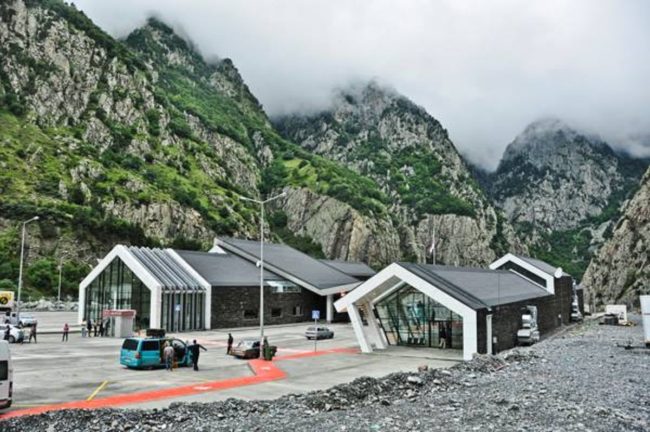

Discussions over whether or not Georgia should restore diplomatic relations with Russia emerge time and time again. However, arguments on both sides of the divide are naïve, misleading, and ultimately pointless.
Plenty of topics have the potential to ignite Georgian society and provoke heated debates; but none like the Russian issue can divide it so clearly into ‘pro-Western’ and ‘pro-Russian’ sides, into ‘patriots’ and ‘traitors’. Last spring, a controversial deal with Gazprom once again raised questions over the current government’s policy toward its northern neighbour. Local political groups and activists clashed over the possibility of restoring Georgian-Russian diplomatic relations.
Georgia has not had official diplomatic relations with Russia since in August 2008, Russia initiated a military campaign to ‘coerce Georgia to peace’. They then recognised the separatist regions of Tskhinvali and Abkhazia as independent states. In response, Mikhail Saakashvili, president of Georgia from 2004 to 2013, unilaterally broke-off diplomatic relations with Moscow. After a decisive victory in parliamentary and presidential elections in 2012 and 2013, the newly elected coalition government of Georgian Dream promised to improve Georgian-Russian relations. The restoration of direct official inter-state communication is seen by Russia as a logical step toward reconciliation; meanwhile many in Georgia have serious doubts and fears about the consequences.
Russia wants to clean up its image
Some experts argue that Russia’s attempts to normalise relations with Georgia is a direct result of its military conflict in Ukraine. They argue that Moscow is trying to find common ground with Tbilisi to avoid alarming other post-Soviet nations with their foreign policy of undermining the sovereignty and territorial integrity of neighbouring states. While this theory is certainly plausible, Russia needs a friendly Georgia on its doorstep regardless; it has political and geopolitical value.
There is now no doubt that Saakashvili’s aspiration to rapidly integrate the country into NATO has failed. The Kremlin not only managed to indefinitely postpone Georgia’s NATO aspirations, but took full control over Georgia’s separatist regions, establishing new military bases and strengthening their grip. Despite these advantages, and Tbilisi’s deepened vulnerability, Putin’s regime is losing the war for hearts and minds. Russia realises that the current situation precludes any scenario where Georgian society re-unites with their Orthodox Christian brother-nation.
The (overblown) threat of Russian infiltration
In the absence of diplomatic relations, Russia’s activities on the ground are very restricted. We can assume that restoring official links would create more opportunities for Russia to work more closely with Russian sympathisers within Georgian who do not see themselves as part of the Western world, and do not share the view that being Georgian means being European. However, even if they had these opportunities, it is doubtful that Russia would be able to compete with Western influence and somehow re-direct Georgian society toward the North. The Kremlin simply does not have the financial resources, knowledge, or even the will.
Georgian society is divided on the issue. Former members of Saakashvili’s government are the strongest opponents of restoring formal ties. For them there is no purpose in any direct dialogue with Russia (even under the current Abashidze–Karasin format) unless they withdraw recognition of separatist regions as independent states. They argue that Georgia must maintain its tough stance against Moscow to prevent the country from falling under the influence of the Kremlin again. Moreover, they consider the current government’s policy to be collaboration with an occupant country contributing to its increasing influence in Georgian regions.
Russia will not reverse its policy
On the other side, we have a group of people who believe that direct dialogue between the two states is essential. For them, Tbilisi should restore diplomatic relations to start negotiations with Russia, and to persuade Putin’s government to return Tskhinvali and Abkhazia regions in exchange for some concessions — Georgia’s political and military neutrality.
Both cases rely on some misleading assumptions. Opponents of diplomatic relations are politically motivated, and their fears are more self-imposed than real. For years Saakashvili’s government used Russia as a political tool to deflect attention from domestic challenges and to rally Georgian society around his regime. This exaggerated narrative of a looming Russian threat have become an inherent part of the political outlook of so-called pro-liberal forces in the country.
It is also naïve to believe that Georgia can simply negotiate terms of sovereignty and territorial integrity with Russia. The Kremlin will not and cannot change its current policy. To reconsider the decision it took after the August 2008 War would damage Russia’s prestige as a consistent political player and throw into doubt the correctness of Putin’s foreign policy.
Why do anything at all?
Restoration of Russian-Georgian diplomatic relations is not a grand question of ‘to be or not to be’ as it is represented by some, including in the Georgian media. It is an issue of necessity; whether Georgia needs it at all? From a practical point of view: barely is the answer. It would be fallacious to assume that putting a Russian flag over building and calling it ‘the Embassy of the Russian Federation’ would contribute in any meaningful way to inter-state economic turnover, or increase trade deals and cultural exchange programs. And it will definitely not solve topics crucial for Georgia, such as its territorial integrity, sovereignty, and security challenges. But it may legitimise Russia’s approach and further strengthen the political image of the current government in the Kremlin on both domestic and international fronts.
It would be far more politically prudent to simply leave things as they are. If Russia is seriously intent on improving relations with its South Caucasus neighbour it must make the first real step in reconciliation; a step we have yet to see any sign of. Russia considers itself the ‘big brother’ in this relationship, hence, it needs to play accordingly.
All place names and terminology used in this article are the words of the author alone, and may not necessarily reflect the views of OC Media’s editorial board.








